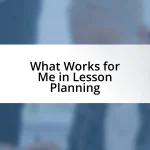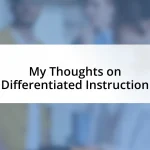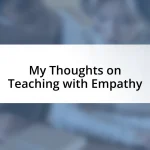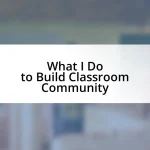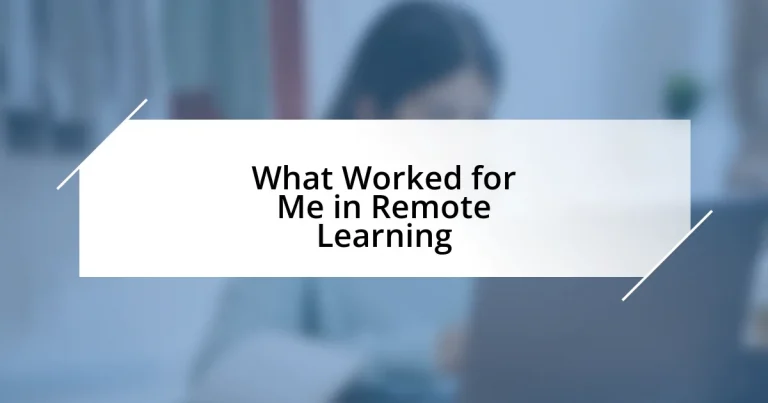Key takeaways:
- Establishing a daily schedule enhances focus, accountability, and motivation, leading to a balanced routine in remote learning.
- Utilizing effective tools like digital whiteboards and task management apps streamlines learning and fosters collaboration.
- Creating a dedicated study space minimizes distractions and promotes a productive learning environment.
- Engaging with online communities provides emotional support and enriches understanding through shared knowledge and experiences.
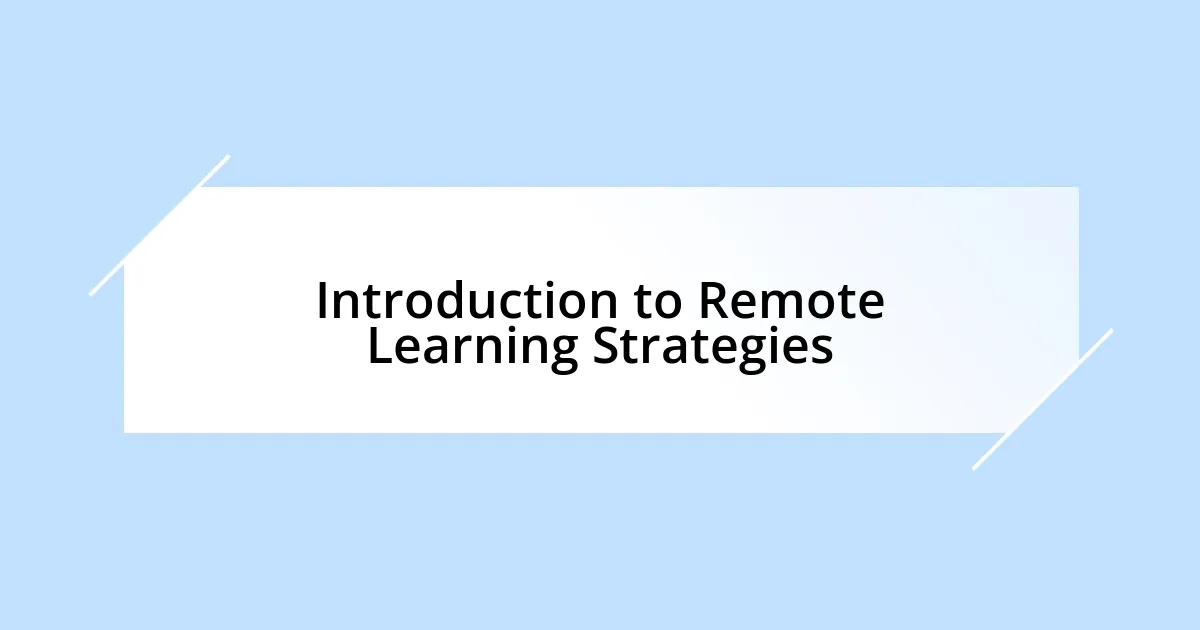
Introduction to Remote Learning Strategies
Remote learning has reshaped the way we engage with education, turning our homes into classrooms and our screens into windows for knowledge. I still remember my first week of remote classes; the excitement mixed with uncertainty felt like embarking on a new adventure. Can you relate to that blend of hope and hesitation?
Over time, I discovered that effective strategies are crucial to navigating the remote learning landscape. Building a daily routine, for instance, transformed my experience. By setting specific times for study, breaks, and personal projects, I created a sense of normalcy that kept me grounded. Isn’t it fascinating how structure can enhance our focus and productivity?
Moreover, leveraging technology played a significant role in my success. I found myself exploring tools that facilitated interaction and collaboration, opening doors to new ways of learning. Did you ever think of how much easier it is to connect with peers and instructors now? Sharing thoughts through discussion boards or video calls has not only reinforced my understanding but also built a sense of community, even at a distance.
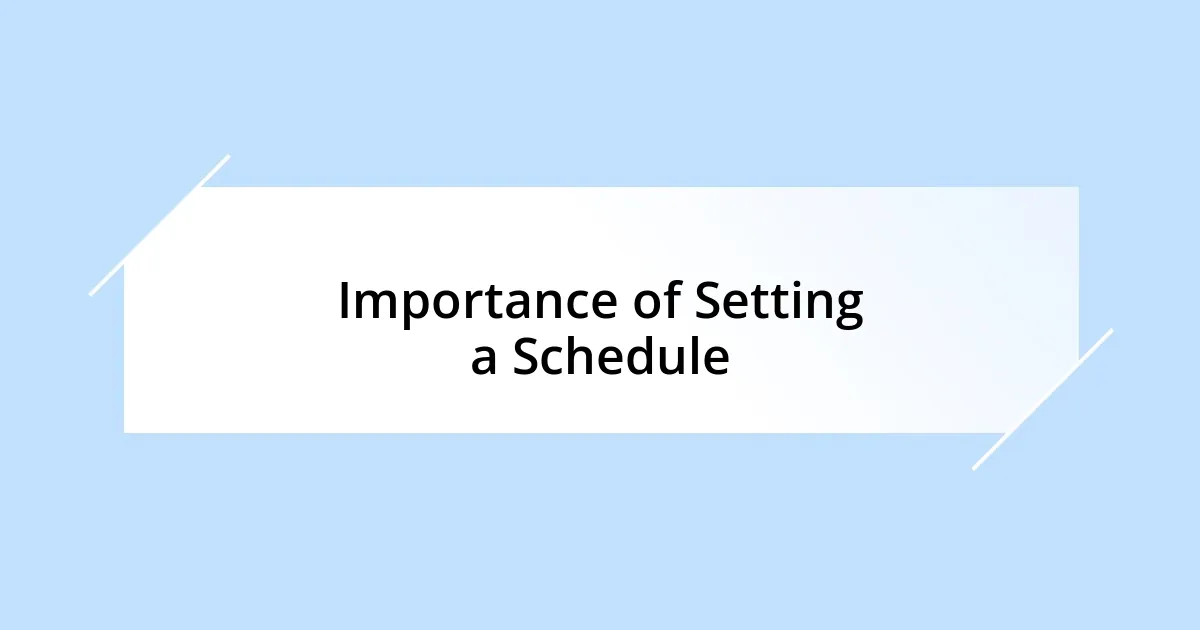
Importance of Setting a Schedule
Setting a schedule during remote learning is akin to drawing a map for a journey. Without it, I often found myself wandering aimlessly from one task to another. I vividly remember days where I lost track of time, only to realize I hadn’t tackled half of what I intended. That structure, which felt rigid at first, eventually became my guiding framework—a reassuring presence that kept procrastination at bay.
Here are a few reasons why establishing a schedule has been a game changer for me:
- Maximized Focus: Allocating specific study times helped me dive deeper into subjects without distractions.
- Enhanced Accountability: Knowing when I had to be online made it easier to stick to my commitments and complete assignments on time.
- Balanced Routine: Including breaks and personal time in my schedule kept burnout at a distance, which I learned the hard way.
- Boosted Motivation: Crossing off completed tasks provided an uplifting sense of accomplishment, fueling my drive to keep going.
When I made scheduling a priority, it transformed my chaotic days into a more harmonious blend of learning and self-care. It’s fascinating how the simple act of time management can shape our overall experience, don’t you think?
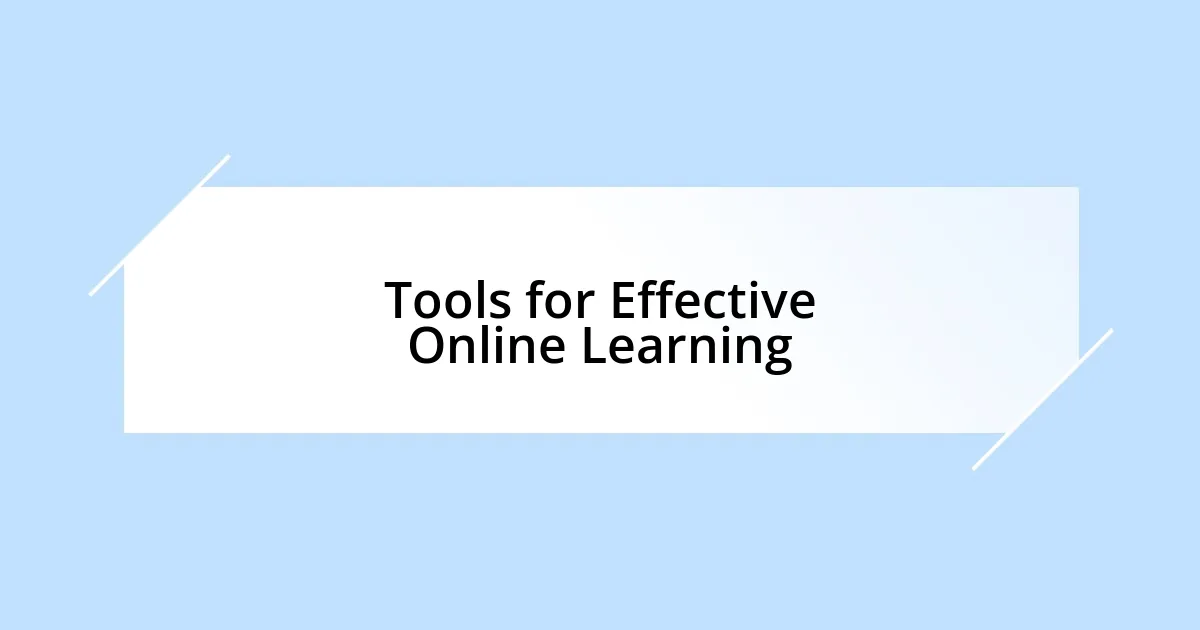
Tools for Effective Online Learning
Finding the right tools for effective online learning has been essential for my success, much like assembling the right gear for an outdoor adventure. Early on, I experimented with various platforms and applications, and what struck me was how some tools truly made the learning experience more engaging. For instance, I found that using digital whiteboards helped me visualize concepts and collaborate seamlessly with my peers, which was especially valuable during group projects. How have you approached selecting your learning tools?
Additionally, integrating productivity apps into my routine transformed my workflow. I recall incorporating task management tools like Trello, which allowed me to keep track of assignments and deadlines visually. This not only streamlined my tasks but also provided a sense of achievement as I moved items from ‘To Do’ to ‘Done.’ It’s amazing how technology can simplify our lives, isn’t it?
Lastly, video conferencing software became a lifeline during remote learning. I remember the first virtual class I attended; it felt surreal but energizing to see my classmates and teachers on-screen. Engaging in real-time discussions helped maintain a connection that text-based communication couldn’t provide. It’s interesting how these tools not only facilitate learning but also foster relationships that might otherwise fade in a remote setting.
| Tool | Functionality |
|---|---|
| Digital Whiteboards | Visual collaboration for concepts and ideas |
| Task Management Apps (Trello) | Organizing assignments and tracking deadlines |
| Video Conferencing Software | Real-time interaction and discussions |
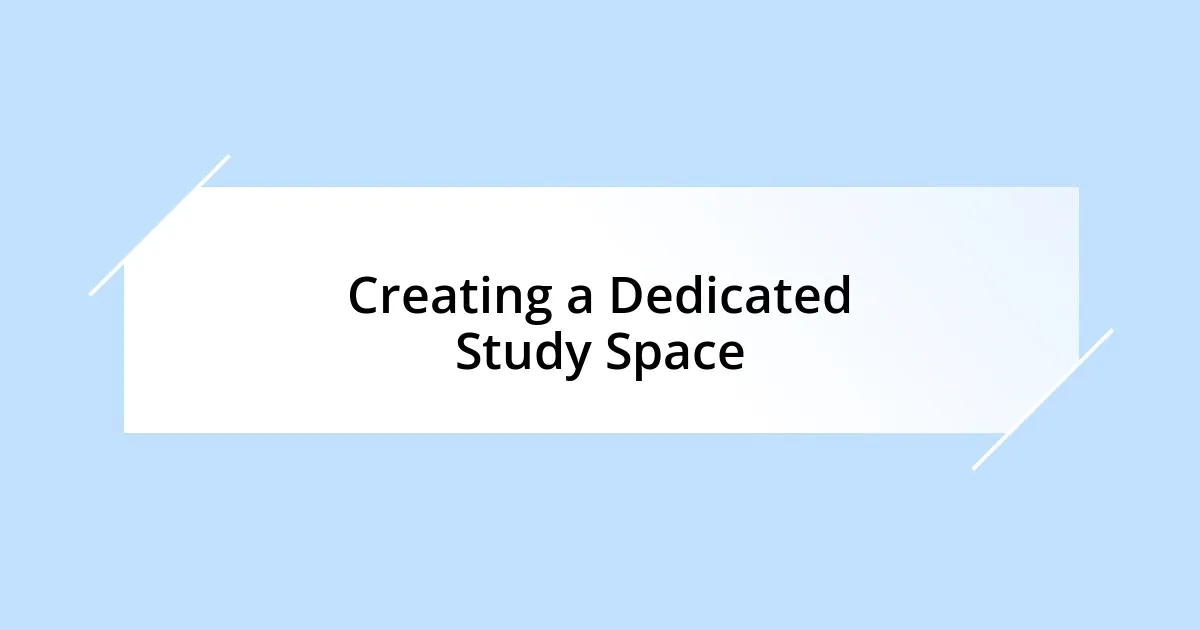
Creating a Dedicated Study Space
Creating a dedicated study space is a decision I made that profoundly impacted my learning experience. Initially, I tried studying on my bed or at the kitchen table, but I quickly noticed how those environments fostered distractions. I remember one evening, attempting to study in the living room while my family watched TV. It was a struggle to concentrate; the noise turned everything into background chaos, and my motivation dwindled. Establishing a specific space for studying transformed that chaos into clarity.
When I set up my study area, I made sure it reflected my personality, filled with inspiring quotes and a comfy chair that welcomed me. The moment I sat there, it felt like a switch flipped; I was ready to learn. I even took the time to arrange my supplies, so everything I needed was within reach. This deliberate organization helped boost my focus and made me feel more prepared. Have you considered how your environment influences your mindset?
It’s fascinating how something as simple as a desk, a good chair, and proper lighting can elevate your learning. I remember finally investing in a small desk lamp that illuminated my space just right. It created a cozy ambiance that made study sessions feel less daunting and more inviting. The comfort of having a dedicated area—free from distractions—made a world of difference; I began to associate that space with productivity and success. Creating a study space is not just about having a location; it’s about crafting an environment that nurtures your educational journey. What will your dedicated space look like?
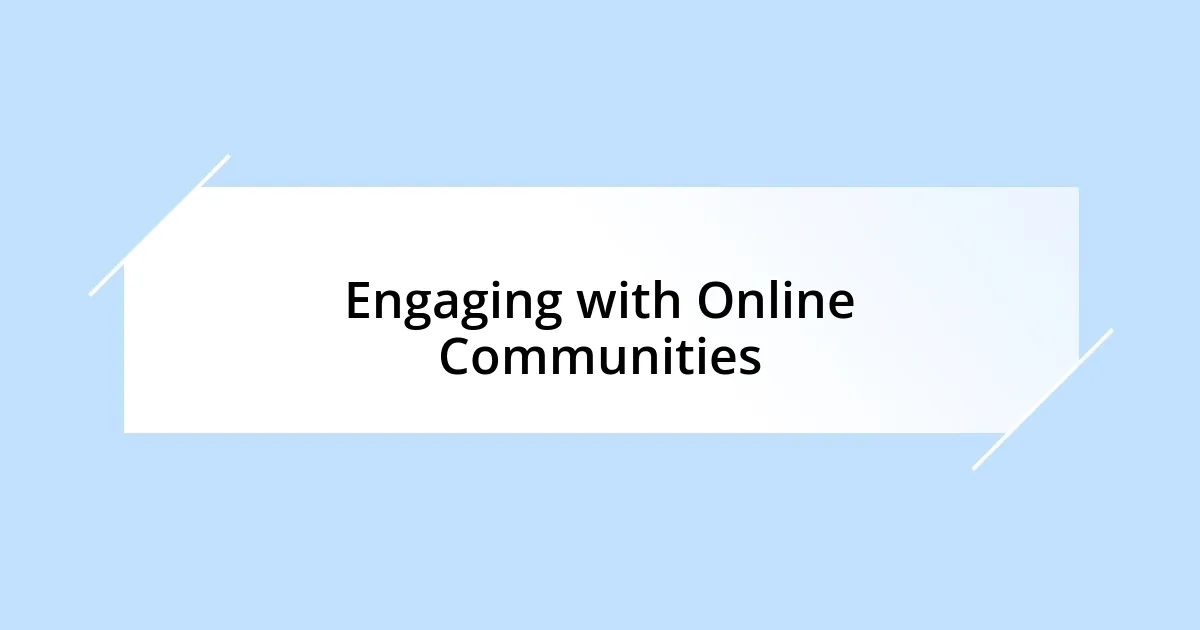
Engaging with Online Communities
Engaging with online communities became a game-changer in my remote learning journey. I vividly remember stumbling upon a specialized group on social media dedicated to my field of study. The dynamic exchanges and shared resources not only enriched my understanding but also gave me a sense of belonging. Isn’t it comforting to know others are navigating similar challenges?
Participating in these communities often felt like attending a virtual study group. I recall one forum conversation where someone shared their notes on a complex topic I struggled with. It was a lightbulb moment for me; the clarity they offered helped spark my interest and motivated me to dive deeper into the subject. Don’t you think that sharing knowledge can create a ripple effect, inspiring others just as much as it helps ourselves?
Moreover, the emotional support I found within these communities was invaluable. There were days when I felt overwhelmed, and reading others’ stories made me realize I wasn’t alone in my struggles. I remember a post where someone expressed their worry about exams, and seeing dozens of encouraging comments provided a sense of camaraderie that soothed my anxiety. How often do you think sharing vulnerabilities can strengthen connections in learning environments?
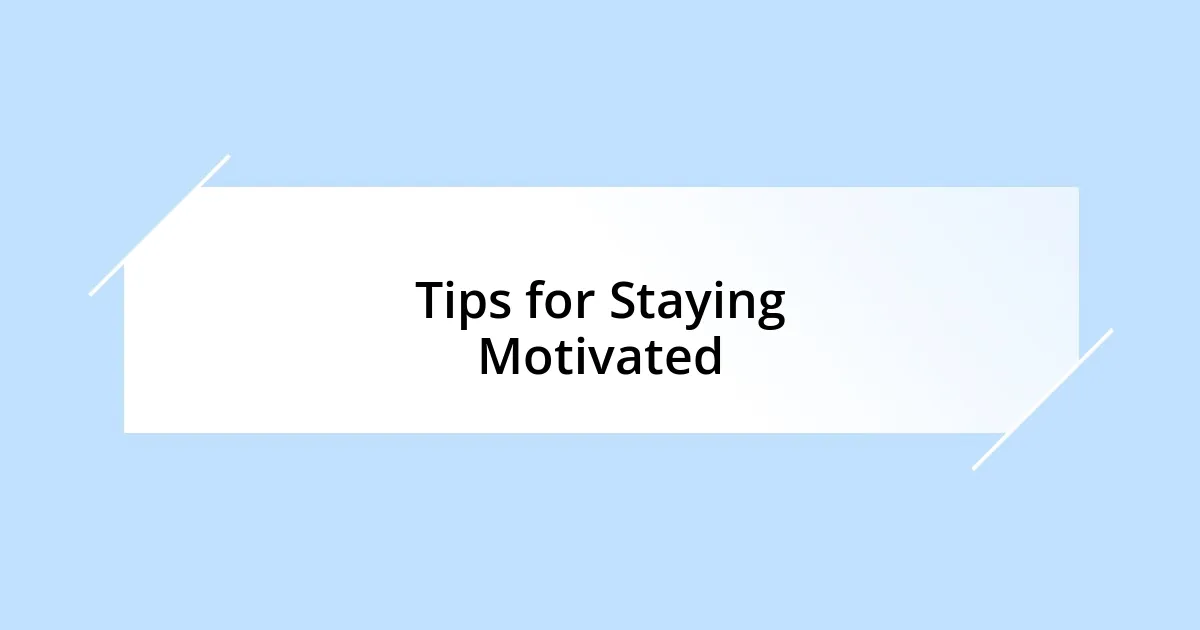
Tips for Staying Motivated
Staying motivated in a remote learning environment can sometimes feel like climbing a steep hill. One method that worked wonders for me was setting small, achievable goals. I vividly remember a time I decided to break my study sessions into 25-minute blocks, followed by a five-minute break. This technique, known as the Pomodoro Technique, kept me laser-focused during those bursts and eager for the next challenge. Have you ever noticed how accomplishing even small tasks can create a momentum that drives you forward?
Another tip that truly resonated with me was the importance of celebrating milestones, no matter how minor. When I completed a challenging assignment or hit a study goal, I’d reward myself—whether it was enjoying a favorite snack or taking a stroll outside. That small celebration didn’t just feel like a treat; it reinforced my motivation and reminded me that every effort counts. Don’t you agree that acknowledging our hard work can make the journey more enjoyable?
Lastly, I found that incorporating variety into my study routine kept my motivation buzzing. I often switched between different subjects or study methods, mixing in videos, podcasts, or even hands-on activities when possible. I remember one day when I decided to create a colorful mind map instead of traditional notes. It transformed my engagement level and made studying feel more like an adventure. How do you keep your learning fresh and exciting?

Evaluating Your Progress Regularly
Evaluating my progress regularly was a crucial part of my remote learning experience. I made it a habit to set aside a few moments each week to reflect on what I had learned. There were times I would jot down my key takeaways in a journal, which not only helped me track my growth but made me feel accomplished, like I was building my own learning map. Have you ever tried such mapping to visualize your educational journey?
One technique that really helped was a simple weekly review session. I’d sit down with a cup of tea, going over my notes and assignments. Interestingly, this practice revealed patterns in my learning—what topics excited me, and which ones left me frustrated. I distinctly recall recognizing that I struggled with a particular subject but thrived in another. Isn’t it empowering to understand your strengths and weaknesses more clearly?
In addition to this, I also sought feedback from peers and mentors. One time, after presenting my findings in a virtual meeting, my mentor commended my analytical approach but pointed out areas for improvement. Initially, it stung a little, but I realized it was an opportunity for growth. Isn’t feedback often the compass that guides us on our learning paths? Regular evaluation became a cornerstone in my educational experience, transforming challenges into stepping stones toward success!



